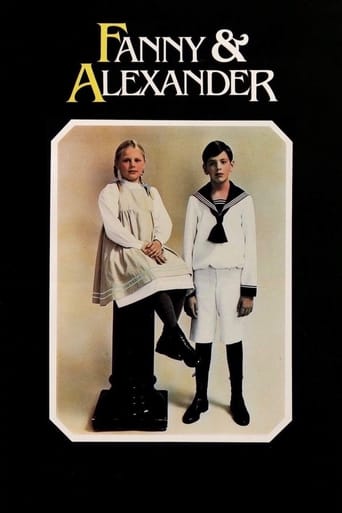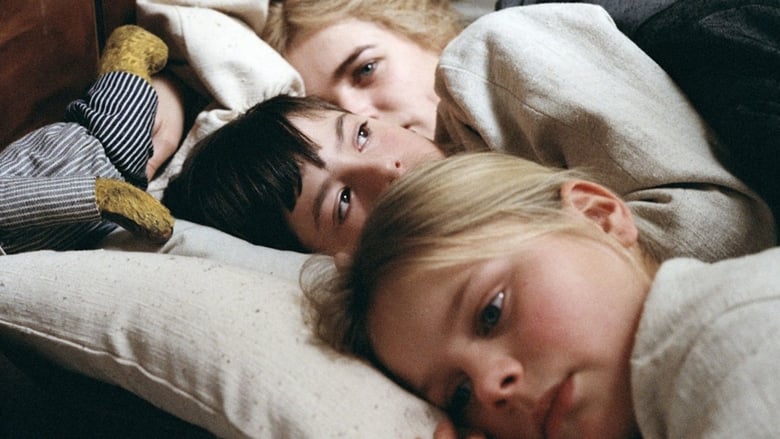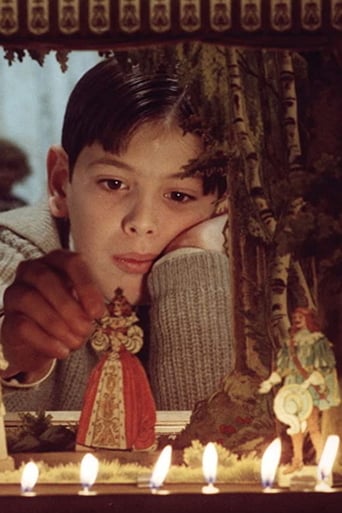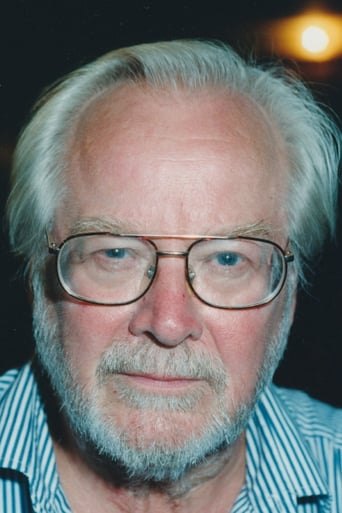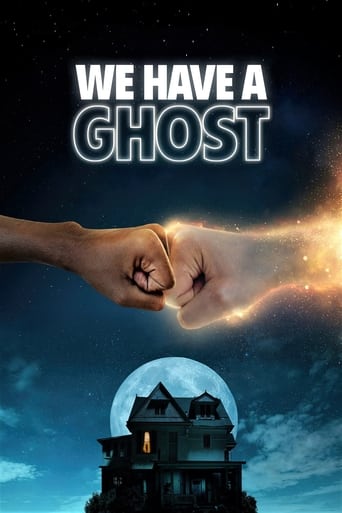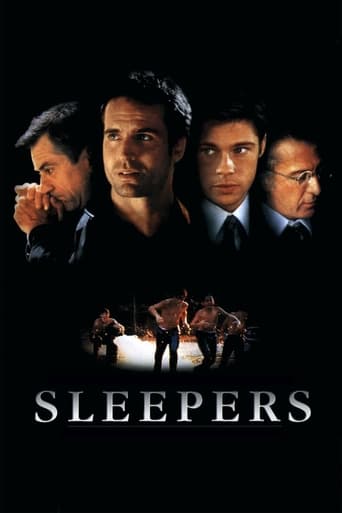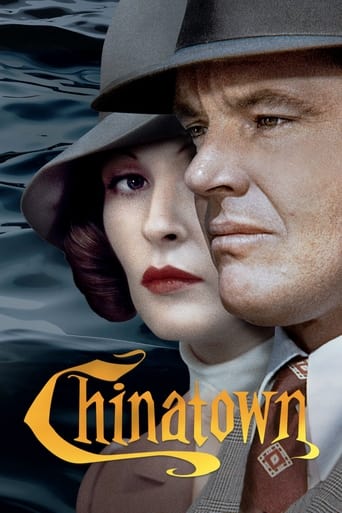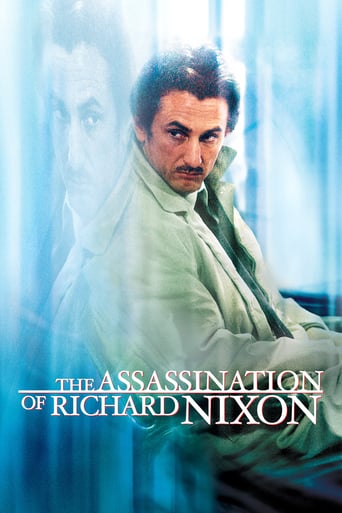Fanny and Alexander (1983)
As children in the loving Ekdahl family, Fanny and Alexander enjoy a happy life with their parents, who run a theater company. After their father dies unexpectedly, however, the siblings end up in a joyless home when their mother, Emilie, marries a stern bishop. The bleak situation gradually grows worse as the bishop becomes more controlling, but dedicated relatives make a valiant attempt to aid Emilie, Fanny and Alexander.
Watch Trailer
Free Trial Channels
Cast


Similar titles
Reviews
very weak, unfortunately
good back-story, and good acting
A waste of 90 minutes of my life
It is a whirlwind of delight --- attractive actors, stunning couture, spectacular sets and outrageous parties.
This picture is in the spirit of magical realism, where the elements of mysticism are interwoven, which play a role in the search for the answers posed by the author about the existence of God, about the crisis of religion and the value of family and love. The author of the film does not usually put points, but shows the final situation.This episode smooths out suspicion from the previous situation, there is no disharmonious sense of the possibility of tragic events and there is no optimistic mood at the same time. Everything is natural and everything can be.The picture really deserves the "Oscar" in the category "Best Foreign Film" and for Ingmar Bergman it became the third gift from the Academy.In the cinemas was a shortened version of the film little more than 3 hours, the full directors version is 4 series with a total time over 5 hours.Strong and beautiful film from Ingmar Bergman, I recommend to view. 9 out of 10.
I saw the 6 hour 20 minutes long super extended cut for this movie. Movie which I've been planning to watch for years, but have always pushed the box set further and further back behind the front shelves. Now that I finally decided to give it some 7 hours of my life and watch it, I can't do much more than feel sick due to how much I wasted my time watching this garbage, and how much shorter it could've been. This is basically Downton Abbey for people who prefer their movies "smart" and "tedious" so they can say the exact opposite from what really happened and act like there is something much deeper and complex and philosophical beneath the surface while the movie itself is actually so shallow and fragile even scratching its surface destroys the whole work because all it has is its shell. But wait, maybe this is why it is so smart and deep. It is so shallow and fragile, just like life itself. Very smart and deep and philosophical, would give 10/10 and call it a masterpiece because that's definitely what this movie is and not something I'd just use to justify my rating for it and call myself smart for liking it. In a way, this is the predecessor of the movie Boyhood (2014). That movie is known as the most mediocre movie ever made, but also has metascore of 100/100, just like this movie. The main difference between these titles is that Boyhood can even mildly make the viewer identify with the main character's life and his problems there were Fanny and Alexander live their life in completely different type of mediocrity in a different time period, in a different world, which, based to this movie, is so boring I can't help but wonder how these people managed to die off for natural causes and not just kill themselves during their depressive boredom.
"Fanny and Alexander" starts with a lavish Christmas reunion of the same epic scale and narrative value as the wedding party in "The Godfather". It then proceeds to an untimely death that put all the family in shock. When mourning time is over, the widow resigns to find a stronger role model for her children, she marries a rigid bishop and then life flies over the darkest and toughest pages of the Family book, punctuated with strange supernatural encounters and deep metaphysical wanderings. Eventually, death shows up again, natural or not, and the movie concludes with another family reunion, celebrating two births, and through them, life with its share of joy, sadness, silences, cries, whispers and wild strawberries. It is a credit to Ingmar Bergman's visionary practicality to make a film about a bourgeois family, spanning a relatively short lapse of time, yet containing a plot whose existential implications could cover countless pages of philosophical essays. Life and death, their meanings or meaninglessness, have never been as fully approached without ever exuding "intellectual" vibes. It is indeed extraordinary that such a film would also manage to tell an entertaining and captivating family drama's story. And no less extraordinary that the film, deprived from more than one-hour and half, would still manage to maintain its relevance and style (almost) intact and be such a universally praised masterpiece. But who said Ingmar Bergman was an ordinary director? This is the work of a lifetime and if Bergman really decided to make it his testimony film, he couldn't have found a better way to conclude his body of work. There's more than a story about children in "Fanny and Alexander", the title is rather misleading on that level, the film, set at the dawn of the 20th century, circa Bergman's childhood, shows the very world that shaped the tormented mind of the soon-to-be cinematic genius, a world of contradictions where lust is forbidden but temptation everywhere. There is this eternal presence of God, from the joyful Christmas celebration to the grim discipline of an overzealous Bishop; but the ultimate paradox of Bergman's movie is that it's less God's nonexistence than his silence that calls for doubt and anger. God is Bergman's most defining antagonist.And in this lost battle, each one finds his way. Like "The Godfather", the central Family, the Ekdahls, is a fascinating mix of personalities: from a gentle matriarch who keeps on her respectable facade, to her sons, they all have a different approach to life. Gustav Adolf, a baker and hedonistic man, seizes the day and enjoys flirting and partying with maids, with the surprisingly progressive consent of his wife. Carl is the second son, a failed professor who's responsible for perhaps the most heart-wrenching loser's monologue I've ever seen in a film. He's disgusted by his failure and even the consolations' attempts of his well-meaning German wife are welcomed by hatred and disdain, this is a well-educated man who've lost his faith on life and goes through it, chained to the certitude of his own mediocrity.The third son is Oscar, he manages a theatrical troop with his beautiful wife Emilie (Ewa Fröling), also an actress along with their children, Fanny and Alexander. The man is worn down by the weight of stress and after Christmas, he's victim of a fatal stroke. Alexander can't stand the sight of his father dying, he hides under a table and utters curse words during the funeral; this is a child desperately hanging on his childhood with a rather adult tenacity. But his greatest challenge comes when the existentially lost Emilie, chooses the austere yet handsome Bishop (Jan Malmsjö) as a husband, finding in this man the serene connection to reality she felt lacking in her life. Then starts the soul-wrestling relationship between the Bishop and Alexander, confronted to the tyranny of God's rules, and their punishments. You could think Bergman, as a son of a rigid Lutherian, took his autobiographical revenge, but the Bishop is less a villain than a tragic man, lost in the illusion of his own authority being endorsed by God. Indeed, from the chess game in "The Seventh Seal" to the agony in "Cries and Whispers", God is never as present as during painful moments and ironically, life is never as exhilarated as when Death is coming. But there's a different tone in this film, actually more serene, there's a sort of consensus regarding the whole illusion of life, no one is fooled. Even the dead ones aren't of any help. Only the grandmother's Jewish lover (Erland Josephson) has a foot in each world and connects mysticism and reality, as if they finally could reconcile, as if illusion was either the lesser of two evils or a survival game. And this might be why the film, for all its complexity and dramatic undertones, solved its two crucial plot points with "lousy" Deus Ex Machina, what an ironic but so well-put nose thumbs to us, purist and cinematic rigorists. Maybe it is a way to show that God stopped to be an antagonist, and he would always have the final word, but finally, with Bergman's consent. And here's the genius closing the arc of his religious torments like "Scenes from a Marriage" did for the theme of infidelity. And on that level, the best advice I could give is: do yourself a favor and watch the full version just like for the "Marriage" masterpiece. Surely, one hundred extra minutes of Bergman's epitaph movie is an offer a fan wouldn't refuse. And as a fan, I'll conclude the review by saying that Begman is certainly the most original and compelling director, too unfairly associated with black and white intellectual movies while there was more than that, there was human condition with style à la Da Vinci and Shakespearean intensity, he's perhaps the greatest artist of Cinema, a cinematic God with God as a centerpiece.
I've watched this movie many years ago when I was still a teen or maybe in my early twenties. It was horrible. It was so depressing that I decided never to watch an Ingmar Bergman film again. It was my first and only one. Yes, I know that Bergman is considered a great artist. And yes, maybe this film is a piece of art. But even now after so many years, having forgotten about all the details of the story, I still feel the depression. I will not rate the movie because I don't want to be unfair. But I really wish I hadn't watched this.So be warned. If you think you have to watch this because it's movie history, go ahead. But if you are a sensitive person you might be tortured by the hopelessness.

